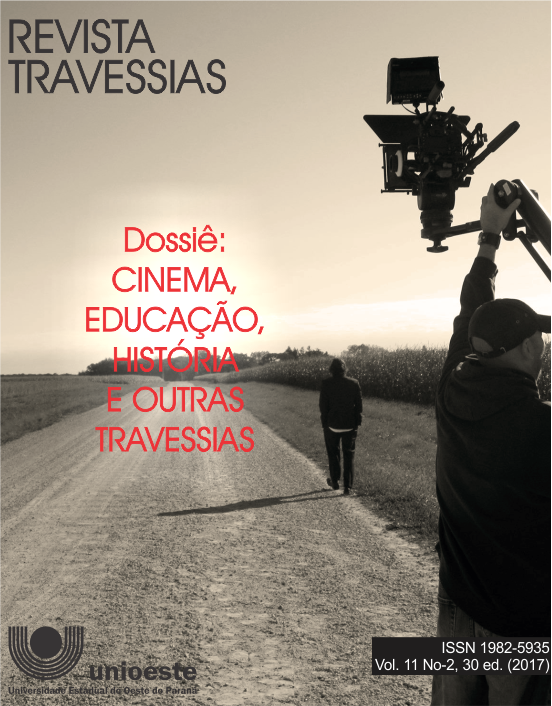Torture: cinema as a source of memory
Keywords:
Torture, Memory, Film Narrative.Abstract
The article aims to approach the Brazilian military regime, represented by its apex, between the late 60’s and early 70’s. It is intended to observe the following fronts: cinema, torture, and women. With the purpose of seeking an understanding of how the film choices were in conjunction with the historical content. For this, the film works "Batismo de Sangue" by Helvécio Ratton and "A memória que me contam" by Lúcia Murat, are the starting points of the reminiscences of those who lived the period. The use of torture as a legal-police resource is part of the works cited, a matter of their histories. The films mentioned say through their cinematographic languages the memories of those who lived the fact. The recollections of the characters who lead the plots, Brother Tito and Ana, of "Batismo de Sangue" and "A memória que me contam" respectively, show that violence is not only momentary but can last to death. The persecution becomes continuous, and the torturers remain next to those who suffered the aggression, that is, in the memory. Also, the participation of women in armed struggle and the emphasis directed to female interaction in opposition to the established regime. For the aid in this discussion, it is based on the literary work; Cinematographic and fictional.Downloads
References
ARQUIDIOCESE DE SÃO PAULO. Brasil: Nunca Mais. 38ª ed. Petrópolis, RJ: Vozes, 2009.
BETTO, Frei. Batismo de sangue: os dominicanos e a morte de Carlos Marighella. 8ª edição. Rio de Janeiro: Civilização Brasileira, 1986.
BENJAMIN, Walter. A obra de arte na era de suas técnicas de reprodução. In: Victor Civita (org). Coleção Os Pensadores. São Paulo: Abril Cultural, 1975.
CALDAS, Álvaro. Tirando o capuz. 5ª edição. Rio de Janeiro: Garamond, 2004.
CARVALHO, Luís Maklouf. Mulheres que foram à luta armada. São Paulo: Globo, 1998.
FON, Antonio Carlos. Tortura – A história da repressão política no Brasil. São Paulo: Global, 1979.
INSUELA, Julia Bianchi Reis. Visões das mulheres militantes na luta armada: repressão, imprensa e (auto)biografias (Brasil 1968/1971). 220 f. Dissertação (Mestrado em História) – Instituto de Ciências Humanas e Filosofia, Departamento de História, Universidade Federal Fluminense, Rio de Janeiro, 2011.
MARTIN, Marcel. A linguagem cinematográfica. Trad. Flávio Pinto Vieira e Teresinha Alves Pereira. Belo Horizonte: Itatiaia, 1963.
MERLINO, Tatiana. Direito à memória e à verdade: Luta, substantivo feminino. São Paulo: Editora Caros Amigos, 2010.
METZ, Christian. O significante imaginário – Psicanálise e Cinema. Trad. António Durão. Lisboa: Livros Horizonte, 1980.
ROSENSTONE, Robert A. A história nos filmes, os filmes na história. Trad. Marcello Lino. São Paulo: Paz e Terra, 2010.
SGANZERLA, Rogério. Por um cinema sem limite. Rio de Janeiro: Azougue Editorial, 2001.
TURNER, Graeme. Cinema como prática social. Trad. Mauro Silva. São Paulo: Summus, 1997.
A MEMÓRIA que me contam. Direção Lúcia Murat. Brasil: Imovision, 2012. (97 min), cor e p/b.
BATISMO de Sangue. Direção Hervécio Ratton. Brasil: Downtown Filmes, 2006. (112 min), cor.
CABRA Cega. Direção Tony Venturi. Brasil: Europa Filmes, 2005 (108 min), cor e p/b.
EM BUSCA de Iara. Direção Flavio Frederico e Mariana Pamplona. Brasil: Kinoscópio, 2013. (91 min), cor e p/b.
EM BUSCA da verdade. Direção Deraldo Goulart e Lorena Maria. Brasil: TV Senado, 2015. (58 min), cor e p/b.
HOJE. Direção Tata Amaral. Brasil: H2O Films, 2011. (87 min), cor.
MEMÓRIA política. Direção Ivan Santos. Brasil: TV Câmara, 2004. (61 min), cor e p/b.
PRA FRENTE Brasil. Direção Roberto Farias. Brasil: Embrafilme, 1982. (108 min), cor.
QUE BOM te ver viva. Direção Lúcia Murat. Brasil: Taiga Filmes, 1989. (97 min), cor.
VLADO – 30 Anos Depois. Direção João Batista De Andrade. Brasil: Oeste Filmes, 2005. (86 min), cor.
ZUZU Angel. Direção Sérgio Rezende. Brasil: Warner Bros. Pictures, 2006. (98 min), cor.
Downloads
Published
How to Cite
Issue
Section
License
Creative Copyright Notice
Policy for Free Access Journals
Authors who publish in this journal agree to the following terms:
1. Authors keep the copyright and grant the journal the right of first publication, with the work simultaneously licensed under the Creative Commons Attribution License, which allows sharing the trial with acknowledgment of authorship and initial publication in this journal.
2. Authors are authorized to take additional contracts separately, for non-exclusive distribution of the work version, published in this journal (eg publish in institutional repository or as a book chapter), with acknowledgment of authorship and initial publication in this journal.
3. Authors are allowed and encouraged to publish and distribute their work online (eg in institutional repositories or on their personal page) at any point before or during the editorial process, as this can generate productive changes, as well as increase both impact and citation of the published trial (See The Effect of Free Access).
Creative Commons License
This work is licensed under a Creative Commons Attribution–NonCommercial-shareaswell 4.0 International License, which allows you to share, copy, distribute, display, reproduce, completely or part of the work, since there is no commercial purpose, and authors and source are cited.



